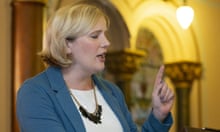The controversial lender Wonga saw losses more than double in 2015 as tougher regulation of the payday loan sector led to a sharp fall in the number of loans taken out by UK consumers.
The UK’s biggest payday loan firm reported a pre-tax loss of £80.2m for the year – up from £38.1m the year before. After tax, the company lost £76.5m, versus £43.6m in 2014.
Although the firm has interests in other countries, its UK short-term lending arm is at the heart of its business, and in 2013 customers in the UK accounted for 3.8m of the 4m loans it granted.
The drop in revenues, to £77.3m from £217.2m in 2014, was driven by a fall in lending following the introduction of stricter criteria at the end of that year and the new price cap for payday lenders at the start of 2015. Across the business the number of loans taken fell to 2.1m.
The losses contrast dramatically with the huge profits made by the firm before the Financial Conduct Authority (FCA) took over regulation of the sector two years ago. It limited the number of times loans could be extended and how many times lenders could attempt to recover repayments from borrowers’ bank accounts.
Months after the FCA intervened, Wonga was embroiled in scandal for sending out fake legal letters to struggling borrowers and cleared the overdue debts or charges for 375,000 people at a cost of £220m. The firm said the process of refunding the affected customers was “broadly complete”, but £10m remained aside for those it had not yet managed to contact.
In January 2015 interest and fees on all high-cost short-term credit loans were capped at a daily rate of 0.8% of the amount borrowed. Meanwhile, if borrowers do not repay their loans on time, default charges must not exceed £15, while the total cost including fees and interest is capped at 100% of the original sum.
Wonga’s results show that revenues from interest fell by more than two thirds, from £157m to £46m.
Despite the downward trend in revenues, the group chief executive, Andy Haste, said he expected 2016 “to mark a turning point in our financial performance”, and for the firm to return to profit next year.
Since moving from the insurer RSA to take the helm, Haste has attempted to reposition Wonga as a firm for middle-class customers. He ditched the controversial Wonga puppets and relaunched the brand with new TV adverts in May 2015.
Haste said: “We have made real progress towards creating a sustainable business with an accepted place in financial services.
“These results are in line with the plans we put together when joining Wonga. They reflect a full year’s impact of the stricter lending criteria we implemented in late 2014, the price cap introduced by the UK regulator in early 2015, and the necessary investment we have made to transform the business. We expect 2016 to mark a turning point in our financial performance.”
Haste said the new management had overhauled its approach to credit risk. Defaults at the firm fell from 7.4% to 4.4% at group level and from 6.6% to 2.8% in the UK.
“We’re pleased with the progress we have made and were delighted to be granted authorisation by the Financial Conduct Authority earlier this year.
“Moving into 2016, our plans included achieving UK authorisation, raising debt funding and starting to roll out new products. Having achieved these, and with further funding planned for later this year, we’re now in a position to move back into growth in 2016 and expect to return to profit in 2017.”
Haste and his team said they had overhauled computer systems at the lender, which were “not fit for purpose”, and completed a redundancy programme that saw 200 people leave the business.
They said the name Wonga was set to remain despite its tarnished reputation. “We’ve always said from the start that we didn’t want to simply change the name, we wanted to show that change could be implemented rather than trying to do a brandwash and run away from the past,” said Haste.
“We have considered whether Wonga one day will become a product name for the kind of loans we’re doing at the moment and we have other names for other things, but we are a bit of a way off from that.”











Comments (…)
Sign in or create your Guardian account to join the discussion